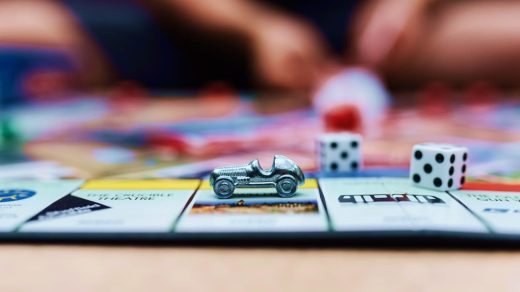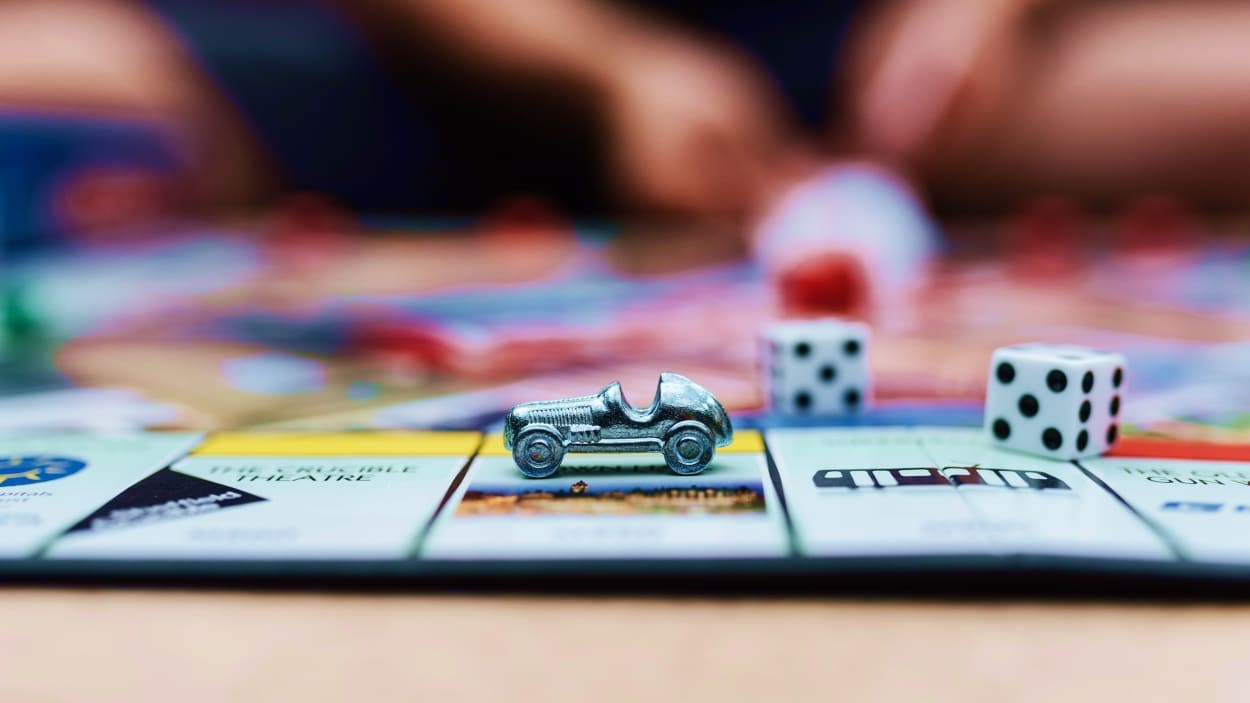From Tic-Tac-Toe to Monopoly, a mathematician reveals the design secret of great games
Marcus du Sautoy is Simonyi’s Professor for the Public Understanding of Science and Professor of Mathematics at the University of Oxford. He is a Fellow of the Royal Society and has written for the Guardian, The Times, and the Daily Telegraph.
Below, du Sautoy shares five key insights from his new book, Around the World in Eighty Games: From Tarot to Tic-Tac-Toe, Catan to Chutes and Ladders, a Mathematician Unlocks the Secrets of the World’s Greatest Games. Listen to the audio version—read by Marcus himself—in the Next Big Idea App.
1. It’s all about games.
The most curious thing happened while I was researching games over the years: As I was writing them all down, I found that I had gathered exactly 80 games—thus the nod to Jules Verne’s book, Around the World in 80 Days. Coincidentally, games play quite an important role in Verne’s book because Phileas Fogg, the protagonist, loves playing games. On his journey around the world, rather than looking out the window at the wonderful view of Mumbai coming into sight, Phileas plays Whist and wins a grand slam of 13 tricks.
On top of this, there’s actually an 81st day in Verne’s book because going around the world, you get an extra day out of the journey. So, I added an extra game to my book—by making the book itself a game. You can read the book from game one to game 80, or you can use dice and jump around the book randomly choosing which game you’re going to read next.
I calculated how many different ways you can read the book, and it turns out it’s a number with 61 digits. If you’d have read a book every second from the Big Bang until today, the number of books you would have read would be a number of about 18 digits. So chances are that the book you generate will never have been read before and will never be read again.
2. Six to start, two no trumps, knight to C3.
These are the opening lines of some of humanity’s greatest games. Games are a little bit like stories; we sit around the kitchen table or a campfire, and a game provides a way to bind the group or community together somehow. For me, the interesting difference between games and stories is that games are a way of being an active participant in stories. Stories can make us cry, but a game can make us feel guilty because of our actions.
Our species loves playing games, not just as children but throughout our adult life as well. Some have even suggested that we should be known as “Homo Ludens,” not Homo sapiens. Games, as it’s been suggested, offer a kind of safe space to explore our universe. As we understand that our universe is governed by rules, we then start developing these games, controlled by rules, as a way of exploring the consequences of those rules.
Others have suggested that it’s actually a tool for exploring our inner worlds, our consciousness. To play a game requires a theory of mind, the ability to think about what your opponent is going to do next and plan accordingly. In fact, I discovered on my travels that games are used in India in arranged marriages to help a new couple get to know each other. Games are very much an expression of our free will and our agency. We choose to play the game, and the decisions we make within the game show an expression of our character.
3. Math and games have a lot in common.
You may wonder why a mathematician, rather than an anthropologist or a historian, has written a book about games, but math and games have a lot in common. A game is a set of rules, a bit like the axioms of mathematics, and playing a game is like exploring the consequences of those rules, a bit like proving a theorem. If you understand the math underlying a game, it can give you a real edge.
Let’s look at Monopoly. What are the best properties to buy in Monopoly? Well, what’s the most visited square on the Monopoly board? It’s the jail square because you can land on that square, or you can land on the square diagonally opposite, which sends you to jail. Or you might pick up a chance card, which sends you to jail, and if you roll three doubles in a row, you are also sent to jail.
In fact, the jail square is three times more likely to be visited than any other square on the Monopoly board—however, you can’t buy the jail square. But consider what the most common throw of two dice from the jail square is: seven. Why? Because there are six ways to make a seven: six and one, five and two, four and three, three and four, two and five, one and six. While to roll a two or 12, you only have one option. So, leaving jail, people are most likely to throw a six, seven, or eight, which lands them in the orange region of properties.
So here’s the tip: Math says that the orange properties can give you an edge in this game. And it turns out that with many games, understanding the underlying math can give you a real advantage.
4. India loves playing games.
India is a country that loves playing games, and some of the greatest games have their origins in India. For example, chess, one of the greatest games of all time, started in India. Interestingly, chess wasn’t originally a two-player game but a four-player game. There were four armies competing on the board, and you had to capture somebody else’s army and make it your own. This is why in the two-player game, you have two rooks, two knights, and two bishops; it’s the amalgamation of two different armies.
The other curious fact is that originally, a dice was used to play chess; you threw a dice in order to decide which piece you were allowed to move next. You didn’t have complete freedom to move any piece; the dice decided which piece you could move. When gambling was banned in India, they had to remove the dice, and the players played this game without a dice; it became a pure strategy game.
Another game with its origins in India is Snakes and Ladders; it was a game used to teach the importance of karma in order to reach nirvana or moksha. The snakes were bad karma, and they would often be labeled with things like drunkenness, which would send you back to the beginning. Good deeds like helping your neighbor would be rewarded by climbing up a ladder. The square you would aim for is a nirvana. If you missed it, then you would actually get reborn and have to go round the board again. It turns out that Snakes and Ladders has deep spiritual origins in India.
5. What makes a great game?
First, a game should never finish before it’s even started. Even if you’re not as good as your opponent, there should be a chance that you can still win. For example, when Donald Trump played chess against Garry Kasparov, it didn’t look like it was going to be a very interesting game. Perhaps if they’d have played Snakes and Ladders, then there’s a chance either of them could have won.
Second, it’s really important that the game shouldn’t finish before it ends. The best games are those in which, right after the last moment, there still remains a chance that anyone could win. This is likely why Monopoly is not a very good game, because very quickly, it becomes clear who owns most properties, and the game becomes one of grinding out the bankruptcy of all the other players.
Third, although there should be an element of chance in a game, it needs to be based on strategy and agency. If there isn’t strategy, the player is converted into a little more than a machine implementing the rules of the game. For example, in Snakes and Ladders, you don’t really play much of a role beyond just throwing the dice to see what’s going to happen next.
The fourth quality is that a game needs simple rules, but they should give rise to a really interesting variety in the ways the game is played. So simple rules allow you to get playing quickly, but the variety provided by multiplying possibilities makes the game worth returning to again and again.
Finally, the fifth quality is that it needs a good story. It doesn’t mean that you have to have castles and goblins, but like a good piece of mathematics, a rewarding game has a really compelling narrative arc to it. A game that encompasses all five qualities is Backgammon. It turns out Backgammon is also one of the most ancient games that humanity has created. It combines those beautiful qualities of having a bit of uncertainty and randomness because of the dice, but even if you get bad throws of the dice, you can still use strategy to win.
This article originally appeared in Next Big Idea Club magazine and is reprinted with permission.
(8)



